In Japanese, washi わし is a first person pronoun typically associated with old men, elders, like a white-haired king of a medieval fantasy country, or an equally ancient sorcerer.
It's also spelled washi ワシ, washi 儂, or washi 私, the latter homonymously with watashi 私. Not to be confused with washi 鷲, which means "eagle," the animal.
Manga: Shijou Saikyou no Deshi Ken'ichi 史上最強の弟子ケンイチ (Chapter 25)
Manga: Galaxy Angel (Chapter 3)
Manga: Seto no Hanayome 瀬戸の花嫁 (Chapter 1)
Manga: Doll-Kara, どるから (Chapter 1)
Nuances
The word washi わし is a corruption of watashi 私. In the early modern period (16th–19th centuries) it was used by women when talking to people close to them, but in the modern world it's used by men when talking to people inferior to them.(デジタル大辞泉)
Inferior in the sense of one's subordinate, or someone who's younger.
This pronoun is preferred by men in the Kansai 関西, who use washi instead of ore 俺.(小畠, 2014:52)
The pronoun wai わい is a further corruption of washi わし.(日本国語大辞典) This one is used in very few regions, mostly southern Kansai(小畠, 2014:52). It's more common common on the internet for sounding funny like "yay."
The pronoun washi わし takes the pluralizing suffix ~ra ~ら, to become washi-ra わしら, "we," "us." The phase washi-tachi わし達 is less common.
| ~ra | ~tachi | |||
|---|---|---|---|---|
| ら | 等 | たち | 達 | |
| わし | 385 | 8 | 22 | 0 |
| ワシ | 36 | 1* | 0* | 0 |
| 儂 | 30 | 4 | 1 | 0 |
- Note: some results with washi ワシ were about eagles, like the oowashi オオワシ, "Steller's sea eagle." Regardless, ~ra is overwhelmingly used with the pronoun washi.
Old Men
In anime, a character that uses washi わし is typically going to be an old man. This is an example of "role language," yakuwarigo 役割語. The character speaks in a particular way to make it clear what sort of character they are.
Besides washi, they'll typically also end their sentences with ja じゃ. For example:
- Context: an old man gets stopped by a couple of policewomen for not obeying a traffic sign.
- washa {anta-ra ga umareru} mae kara unten shitoru-n-ja
わしゃあんたらが生まれる前から運転しとるんじゃ
I have been driving since {before you [two] were born}.- washa わしゃ - a contraction of washi wa わしは.
- shitoru - a contraction of shite-oru しておる, in this case synonymous with shite-iru している.
- ja じゃ - same as the da だ copula, typically used by old men.
- {washi ga menkyo wo totta} koro niwa anna hyoushiki φ nakatta zo!!
わしが免許を取った頃には あんな標識なかったぞ!!
When {I took [my] license} that [traffic] sign didn't exist!!
- Context: Fuurinji Hayato 風林寺隼人, an elder martial arts master, talks about how someone visited him earlier.
- iya, jitsu wa nou...
いや、じつはのぅ・・・
Erm, the truth [is that]...
[To tell the truth]...- iya - interjection.
- nou のう - sentence ending particle typically used by old men.
- hiru ni taisou shinkoku sou ni, washi no tokoro ni kite no~~
昼にたいそう深刻そうにわしの所に来ての~~
At day, looking very serious, [he] came to me, and [then]...- washi no tokoro
わしの所
My place. Where I am. Where I was at the time. - no~~ - same as nou, except in this case used as an interjection between phrases.
- nou has a long vowel expressed by う or ぅ.
- ~ is a stylized ー (prolonged sound mark), which also represents a long vowel.
- washi no tokoro
- Context: a character sitting in agura あぐら position introduces himself, as does his wife.
- washi wa San no chichioya de Seto-uchi-gyorui-rengou Seto-gumi Kumi-chou "Seto Gousaburou" ja
儂は燦の父親で瀬戸内魚類連合瀬戸組 組長 『瀬戸豪三郎』じゃ
I'm Sun's father and Seto's Inner Fish-kind Alliance, Seto Group's Boss, "Seto Gousaburou."- ja じゃ - same as da だ copula, used by characters that sound old.
- 『』 - quotation marks.
- dosu
ドス
*thud* - sono tsuma "Seto Ren"
その妻『瀬戸蓮』!
The aforementioned's wife, "Seto Ren"!
There are exceptions.
- In Baka to Test to Shoukanjuu バカとテストと召喚獣, Kinoshita Hideyoshi 木下秀吉 is a high school boy that's often mistaken for a girl due to his feminine appearance. Nevertheless, he uses washi and ja like an old man. The contrast between these two attributes is an example of gap moe.
Actually An Old Man
Sometimes, a character who doesn't look like an old man is hinted to be an old man by the fact they use washi.
- Context: an old man wakes up in the body of a girl because of a cat.
- kono... kuso nyanko...!!
この・・・クソニャンコ・・・!!
[You]... damn kitty...!! - kono karada wa nan'ya
この体はなんや
What's [up with] this body.- nan'ya - same as nanda なんだ, kansai dialect.
- omae wa nanimono ya...
お前は何者や・・・
Who are you...?- ya - same as the da だ copula, dialectal.
- haa haa
ハァハァ
*panting* - washi ni nan'no urami ga an-nen......!!
ワシになんの恨みがあんねん・・・・・・!!
What do [you] have against me......!!?- an-nen - contraction of aru nen あるねん, dialectal.
- ~ni urami ga aru - to have a resentment, grudge against [someone].
Archaic Speech
The washi pronoun is also used by characters who aren't just old, they're ancient, in the sense that they use archaic Japanese speech instead of modern language.
Typically, such characters are supercentenarians, wizards, sorcerers, sages who have lived for hundreds of years, or perhaps the character comes from a period setting, like an old king of a medieval era country.
In the latter case, it's worth noting that although the king speaks archaically, other characters living in the same medieval age do not. For example, the king may use the archaic ~nu ~ぬ morpheme to conjugate the negative form, while everybody else use ~nai ~ない instead.
- Context: Luft Weizen ルフト・ヴァイツェン, a general in charge of the Angel Troupe space fleet, talks about how he has never met the imperial prince whom they protect.
- sou na no ja
そうなのじゃ
That's right.- ja - same as the da だ copula, typically used by old men.
- {washi ya Enjeru-tai} nimo, {kono fune ni notte} kara wa ichido mo atte wa kudasaranu......
ワシやエンジェル隊にも この船に乗ってからは1度も会っては下さらぬ・・・・・・
{Me and the Angel Troupe}, since {boarding this ship} [he] hasn't met even once...... (literally.)
Not even once {since boarding this ship} [he] met {me or the Angel Troupe}......- ~ni au に会う - to meet with...
- ichido mo 一度も - not even once.
- atte wa kudasaranu - the ~te wa ~ては divides main verb (au) and auxiliary verb (kudasaranu) into topic and focus.
- atte kudaranu - archaic form of atte kudasaranai 会って下さらない, negative form of:
- atte kudasaru
会ってくださる
To meet. (honorific, used when someone superior does something for someone inferior, like the prince meeting with him, which would be an honor.)
References
- 小畠裕将, 2014. 男性の一人称代名詞の地理的分布:『方言文法全国地図』 を用いて. 論叢国語教育学, (10), pp.49-59.
- 私(わし) - デジタル大辞泉(小学館) - dictionary.goo.ne.jp, accessed 2021-03-28.
- わい - 精選版 日本国語大辞典 via kotobank.jp, accessed 2021-03-28.
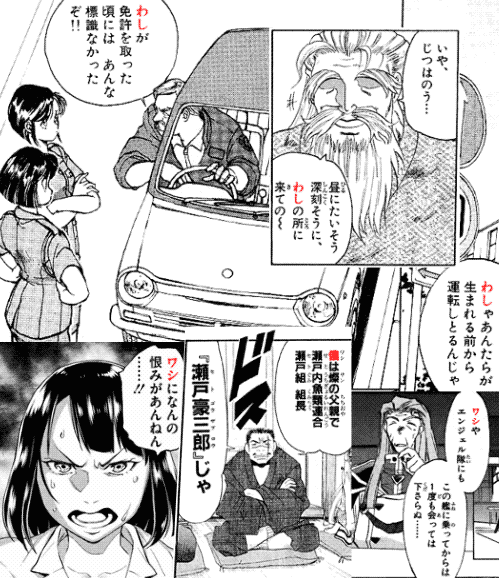
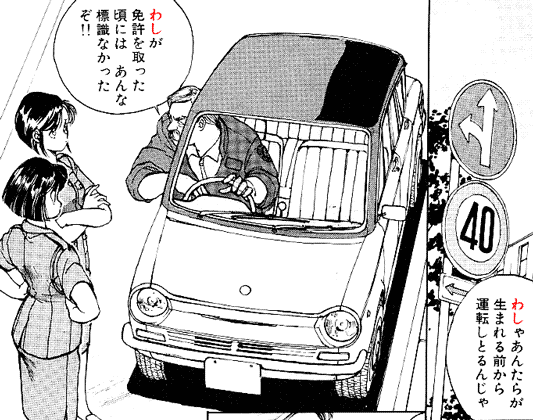
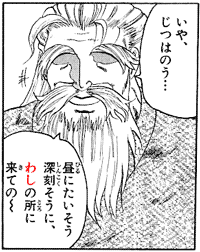
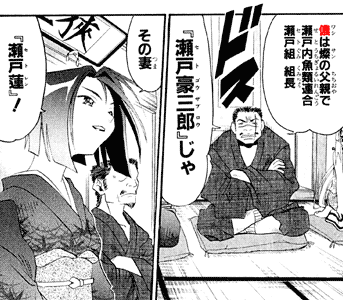
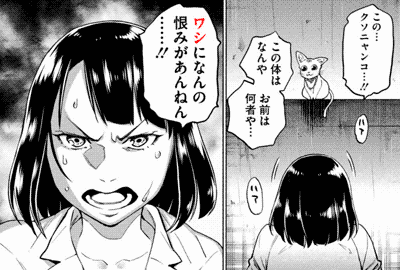
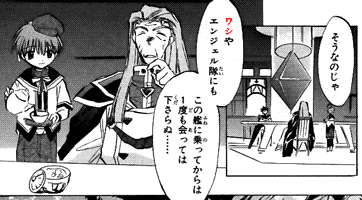
No comments: